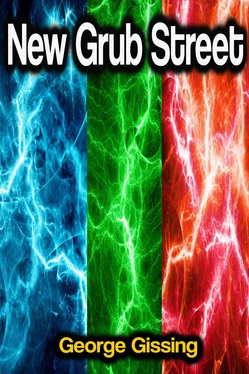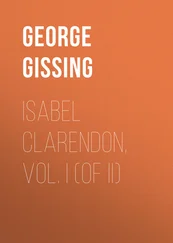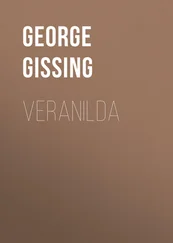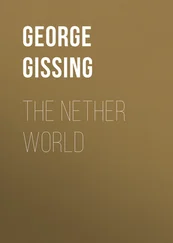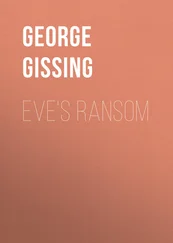George Gissing - New Grub Street
Здесь есть возможность читать онлайн «George Gissing - New Grub Street» — ознакомительный отрывок электронной книги совершенно бесплатно, а после прочтения отрывка купить полную версию. В некоторых случаях можно слушать аудио, скачать через торрент в формате fb2 и присутствует краткое содержание. Жанр: unrecognised, на английском языке. Описание произведения, (предисловие) а так же отзывы посетителей доступны на портале библиотеки ЛибКат.
- Название:New Grub Street
- Автор:
- Жанр:
- Год:неизвестен
- ISBN:нет данных
- Рейтинг книги:3 / 5. Голосов: 1
-
Избранное:Добавить в избранное
- Отзывы:
-
Ваша оценка:
- 60
- 1
- 2
- 3
- 4
- 5
New Grub Street: краткое содержание, описание и аннотация
Предлагаем к чтению аннотацию, описание, краткое содержание или предисловие (зависит от того, что написал сам автор книги «New Grub Street»). Если вы не нашли необходимую информацию о книге — напишите в комментариях, мы постараемся отыскать её.
New Grub Street — читать онлайн ознакомительный отрывок
Ниже представлен текст книги, разбитый по страницам. Система сохранения места последней прочитанной страницы, позволяет с удобством читать онлайн бесплатно книгу «New Grub Street», без необходимости каждый раз заново искать на чём Вы остановились. Поставьте закладку, и сможете в любой момент перейти на страницу, на которой закончили чтение.
Интервал:
Закладка:
‘I am obliged to say, Jasper, that you seem rather thoughtless. If it were only myself I would make any sacrifice for you; but you must remember—’
‘Now listen, mother,’ he interrupted, laying a hand on her shoulder; ‘I have been thinking about all this, and the fact of the matter is, I shall do my best to ask you for no more money. It may or may not be practicable, but I’ll have a try. So don’t worry. If uncle writes that he can’t pay, just explain why you wrote, and keep him gently in mind of the thing, that’s all. One doesn’t like to do brutal things if one can avoid them, you know.’
The young man went to the parlour and listened to Maud’s music for awhile. But restlessness again drove him forth. Towards eleven o’clock he was again ascending in the direction of John Yule’s house. Again he had no intention of calling, but when he reached the iron gates he lingered.
‘I will, by Jove!’ he said within himself at last. ‘Just to prove I have complete command of myself. It’s to be a display of strength, not weakness.’
At the house door he inquired for Mr Alfred Yule. That gentleman had gone in the carriage to Wattleborough, half an hour ago, with his brother.
‘Miss Yule?’
Yes, she was within. Jasper entered the sitting-room, waited a few moments, and Marian appeared. She wore a dress in which Milvain had not yet seen her, and it had the effect of making him regard her attentively. The smile with which she had come towards him passed from her face, which was perchance a little warmer of hue than commonly.
‘I’m sorry your father is away, Miss Yule,’ Jasper began, in an animated voice. ‘I wanted to say good-bye to him. I return to London in a few hours.’
‘You are going sooner than you intended?’
‘Yes, I feel I mustn’t waste any more time. I think the country air is doing you good; you certainly look better than when I passed you that first day.’
‘I feel better, much.’
‘My sisters are anxious to see you again. I shouldn’t wonder if they come up this afternoon.’
Marian had seated herself on the sofa, and her hands were linked upon her lap in the same way as when Jasper spoke with her here before, the palms downward. The beautiful outline of her bent head was relieved against a broad strip of sunlight on the wall behind her.
‘They deplore,’ he continued in a moment, ‘that they should come to know you only to lose you again so soon.
‘I have quite as much reason to be sorry,’ she answered, looking at him with the slightest possible smile. ‘But perhaps they will let me write to them, and hear from them now and then.’
‘They would think it an honour. Country girls are not often invited to correspond with literary ladies in London.’
He said it with as much jocoseness as civility allowed, then at once rose.
‘Father will be very sorry,’ Marian began, with one quick glance towards the window and then another towards the door. ‘Perhaps he might possibly be able to see you before you go?’
Jasper stood in hesitation. There was a look on the girl’s face which, under other circumstances, would have suggested a ready answer.
‘I mean,’ she added, hastily, ‘he might just call, or even see you at the station?’
‘Oh, I shouldn’t like to give Mr Yule any trouble. It’s my own fault, for deciding to go to-day. I shall leave by the 2.45.’
He offered his hand.
‘I shall look for your name in the magazines, Miss Yule.’
‘Oh, I don’t think you will ever find it there.’
He laughed incredulously, shook hands with her a second time, and strode out of the room, head erect—feeling proud of himself.
When Dora came home at dinner-time, he informed her of what he had done.
‘A very interesting girl,’ he added impartially. ‘I advise you to make a friend of her. Who knows but you may live in London some day, and then she might be valuable—morally, I mean. For myself, I shall do my best not to see her again for a long time; she’s dangerous.’
Jasper was unaccompanied when he went to the station. Whilst waiting on the platform, he suffered from apprehension lest Alfred Yule’s seamed visage should present itself; but no acquaintance approached him. Safe in the corner of his third-class carriage, he smiled at the last glimpse of the familiar fields, and began to think of something he had decided to write for The West End.
Chapter 4. An Author And His Wife
Eight flights of stairs, consisting alternately of eight and nine steps. Amy had made the calculation, and wondered what was the cause of this arrangement. The ascent was trying, but then no one could contest the respectability of the abode. In the flat immediately beneath resided a successful musician, whose carriage and pair came at a regular hour each afternoon to take him and his wife for a most respectable drive. In this special building no one else seemed at present to keep a carriage, but all the tenants were gentlefolk.
And as to living up at the very top, why, there were distinct advantages—as so many people of moderate income are nowadays hastening to discover. The noise from the street was diminished at this height; no possible tramplers could establish themselves above your head; the air was bound to be purer than that of inferior strata; finally, one had the flat roof whereon to sit or expatiate in sunny weather. True that a gentle rain of soot was wont to interfere with one’s comfort out there in the open, but such minutiae are easily forgotten in the fervour of domestic description. It was undeniable that on a fine day one enjoyed extensive views. The green ridge from Hampstead to Highgate, with Primrose Hill and the foliage of Regent’s Park in the foreground; the suburban spaces of St John’s Wood, Maida Vale, Kilburn; Westminster Abbey and the Houses of Parliament, lying low by the side of the hidden river, and a glassy gleam on far-off hills which meant the Crystal Palace; then the clouded majesty of eastern London, crowned by St Paul’s dome. These things one’s friends were expected to admire. Sunset often afforded rich effects, but they were for solitary musing.
A sitting-room, a bedroom, a kitchen. But the kitchen was called dining-room, or even parlour at need; for the cooking-range lent itself to concealment behind an ornamental screen, the walls displayed pictures and bookcases, and a tiny scullery which lay apart sufficed for the coarser domestic operations. This was Amy’s territory during the hours when her husband was working, or endeavouring to work. Of necessity, Edwin Reardon used the front room as his study. His writing-table stood against the window; each wall had its shelves of serried literature; vases, busts, engravings (all of the inexpensive kind) served for ornaments.
A maid-servant, recently emancipated from the Board school, came at half-past seven each morning, and remained until two o’clock, by which time the Reardons had dined; on special occasions, her services were enlisted for later hours. But it was Reardon’s habit to begin the serious work of the day at about three o’clock, and to continue with brief interruptions until ten or eleven; in many respects an awkward arrangement, but enforced by the man’s temperament and his poverty.
One evening he sat at his desk with a slip of manuscript paper before him. It was the hour of sunset. His outlook was upon the backs of certain large houses skirting Regent’s Park, and lights had begun to show here and there in the windows: in one room a man was discoverable dressing for dinner, he had not thought it worth while to lower the blind; in another, some people were playing billiards. The higher windows reflected a rich glow from the western sky.
For two or three hours Reardon had been seated in much the same attitude. Occasionally he dipped his pen into the ink and seemed about to write: but each time the effort was abortive. At the head of the paper was inscribed ‘Chapter III.,’ but that was all.
Читать дальшеИнтервал:
Закладка:
Похожие книги на «New Grub Street»
Представляем Вашему вниманию похожие книги на «New Grub Street» списком для выбора. Мы отобрали схожую по названию и смыслу литературу в надежде предоставить читателям больше вариантов отыскать новые, интересные, ещё непрочитанные произведения.
Обсуждение, отзывы о книге «New Grub Street» и просто собственные мнения читателей. Оставьте ваши комментарии, напишите, что Вы думаете о произведении, его смысле или главных героях. Укажите что конкретно понравилось, а что нет, и почему Вы так считаете.
